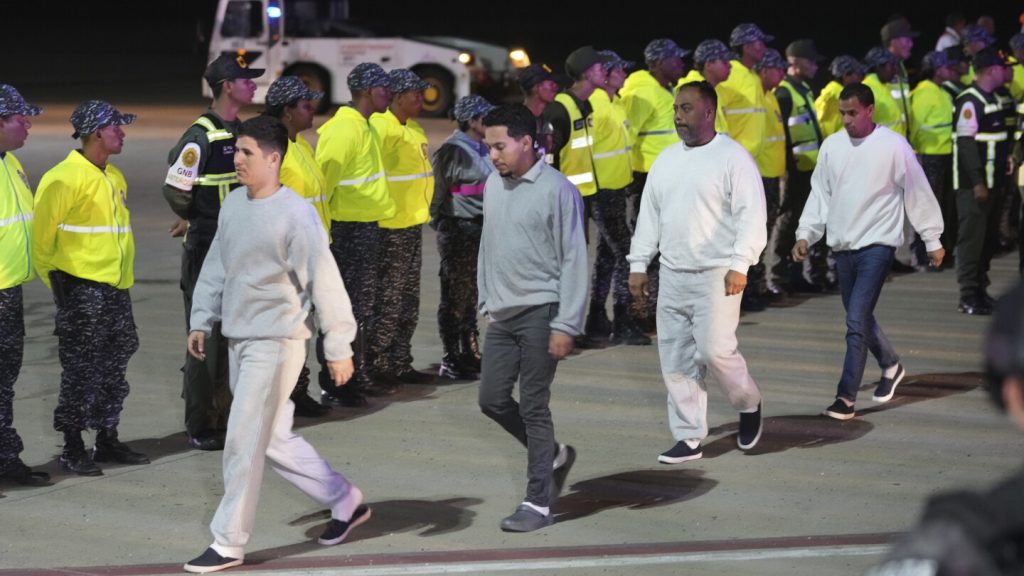A New Chapter in U.S.-Venezuela Relations: Deportation Flights Resume
Introduction: A Breakthrough in Diplomatic Relations
In a significant development that signals a potential shift in the strained diplomatic relations between the United States and Venezuela, two Venezuelan planes departed from the U.S. on Monday, carrying approximately 190 deported Venezuelans back to their homeland. This event marks a rare moment of cooperation between the two nations, which have been at odds for years. The resumption of deportation flights, halted for the most part since a brief period in October 2023 during the Biden administration, is seen as a diplomatic victory for former President Donald Trump, who has been vocal about his efforts to convince other countries to accept deportees. The breakthrough comes on the heels of a visit by Trump envoy Richard Grenell to Caracas earlier this month. The White House announced the resumption of these flights on the social platform X, stating that Grenell had overseen the operation.
Background: The Challenge of Venezuelan Migration
The large-scale migration of Venezuelans to the U.S. began in 2021, with many crossing the border with Mexico illegally. Today, Venezuelans are among the largest nationalities of undocumented immigrants entering the U.S. This influx has posed significant challenges for American authorities, particularly because Venezuela had largely refused to take back its citizens, complicating deportation efforts. The resumption of these flights is thus a notable achievement for the U.S., which has struggled to manage the growing number of Venezuelan migrants. The flights are seen as a potential turning point in addressing this issue, though it remains to be seen whether this signals a broader thawing of relations between the two nations.
The Breakthrough: Trump’s Diplomatic Efforts Pay Off
The resumption of deportation flights is widely attributed to the efforts of Richard Grenell, a former Trump administration official who visited Caracas earlier this month. Grenell’s visit was part of a broader push by the Trump administration to negotiate agreements with countries to accept deportees. The White House highlighted the significance of this development, framing it as a success in Trump’s efforts to get more countries to take back their citizens. Venezuelan President Nicolás Maduro, however, sought to frame the event in his own terms, emphasizing themes of peace, understanding, and cooperation. Maduro’s government has long been critical of U.S. policies toward Venezuela, and the resumption of flights is likely a calculated move to project a sense of normalcy and diplomatic engagement.
Venezuelan Perspective: A Narrative of Dignity and Cooperation
Venezuelan state media covered the arrival of the two Conviasa flights from Fort Bliss, a U.S. Army base in El Paso, Texas, with a tone of triumph. The coverage emphasized the Maduro government’s commitment to a "world of peace, understanding, dialogue, and cooperation," as Maduro himself put it. However, the Venezuelan government also used the occasion to push back against what it described as an "ill-intentioned" and "false" narrative surrounding the presence of members of the Tren de Aragua gang among Venezuelan immigrants in the U.S. In a statement, the Venezuelan government asserted that most of its citizens abroad are decent, hard-working people, and accused U.S. officials of attempting to stigmatize the country by linking it to criminal activity. By framing the resumption of flights as a diplomatic success, Maduro’s government seeks to bolster its image both domestically and internationally.
Complexities and Controversies: Legal and Ethical Challenges
The resumption of deportation flights has not been without controversy. Just days before the flights took place, a federal judge in New Mexico blocked the transfer of three Venezuelan men to Guantanamo Bay, Cuba, where the U.S. had begun sending immigrants. Lawyers for the men argued that their clients fit the profile of individuals the administration has targeted for detention in Guantanamo—specifically, Venezuelan men detained in the El Paso area who have been accused, often falsely, of connections to the Tren de Aragua gang. This legal challenge highlights the ethical and legal complexities surrounding the treatment of Venezuelan migrants, particularly the use of Guantanamo Bay as a detention site. The judge’s decision underscores the ongoing debate over the fairness and legality of U.S. immigration policies, particularly under the Trump administration.
Future Implications: A New Era of Cooperation?
The resumption of deportation flights and the broader diplomatic efforts behind it raise questions about the future of U.S.-Venezuela relations. While the Maduro government has not commented on whether additional flights will follow, the agreement to accept deportees represents a rare point of collaboration between the two nations. At the same time, the U.S. has been exploring other avenues for managing migration, including agreements with El Salvador and Guatemala to take in non-citizens. However, the use of Guantanamo Bay as a detention site has drawn criticism, and the legal challenges to such practices are likely to continue. As the situation evolves, the focus will remain on whether this breakthrough can pave the way for more substantive diplomatic engagement, or whether it will remain an isolated incident in an otherwise fraught relationship.
In conclusion, the resumption of deportation flights from the U.S. to Venezuela marks a significant moment in the complicated history of relations between the two countries. While the immediate focus has been on the logistics of these flights and the diplomatic efforts that made them possible, the broader implications for migration policy, human rights, and international relations cannot be overlooked. As the situation continues to unfold, the world will be watching to see whether this development signals a lasting shift in the U.S.-Venezuela dynamic, or whether it remains a fleeting moment of cooperation in an otherwise adversarial relationship.












